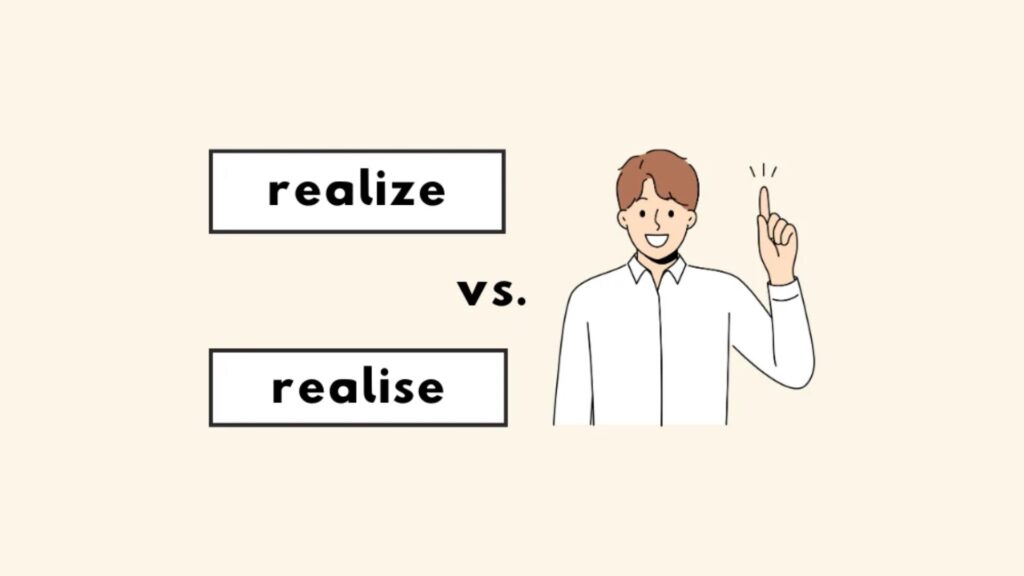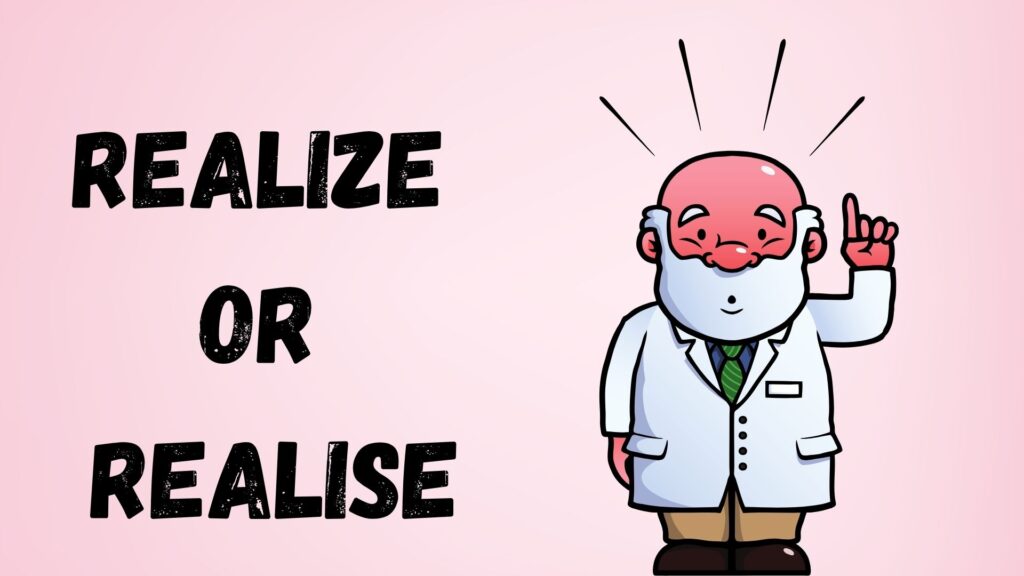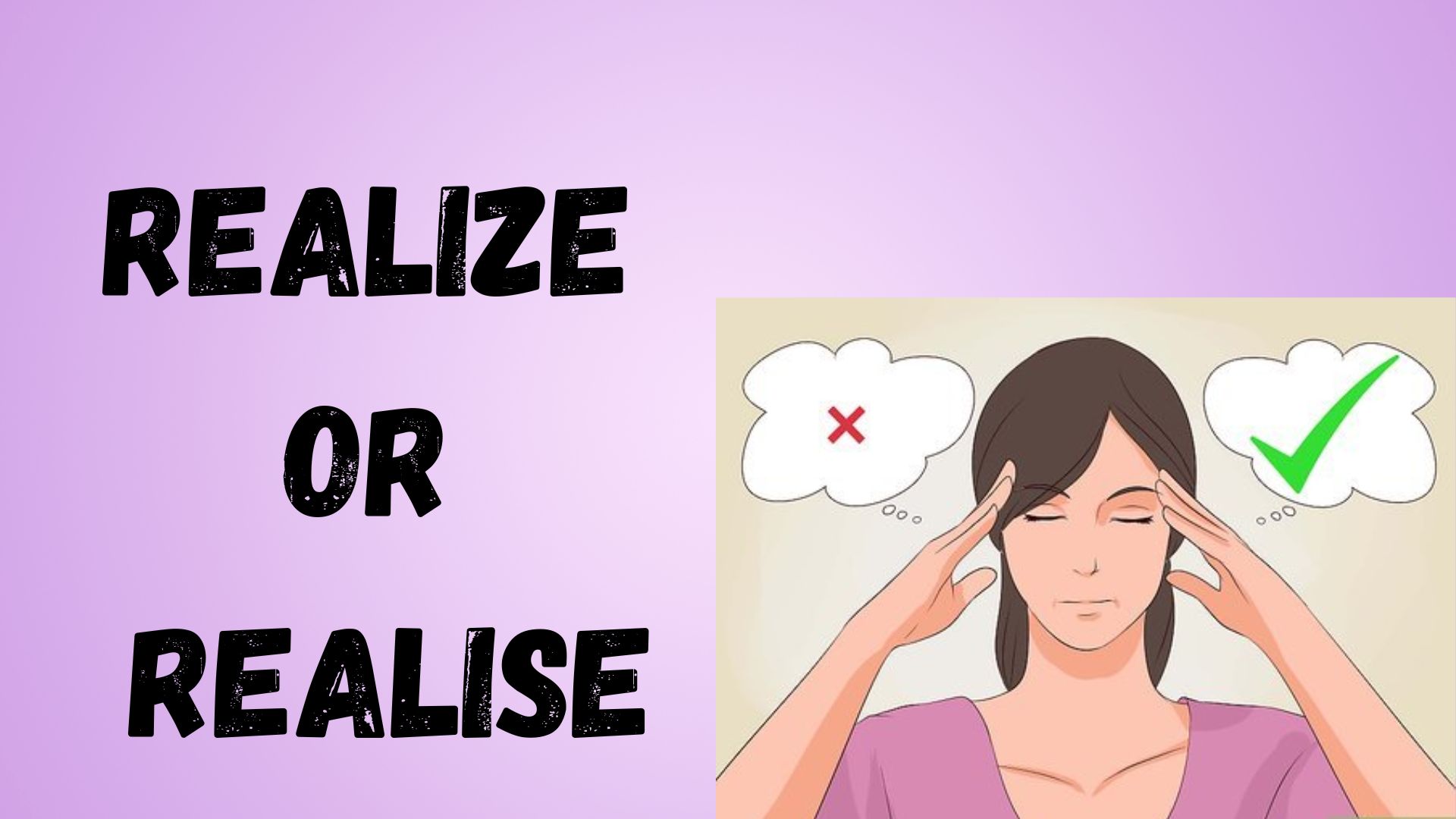Language is a living thing. It evolves, it travels, and more often than not it gets lost in translation across borders. One of the clearest examples of this evolution is the subtle spelling distinction between “realize” and “realise.” If you’ve ever typed one and been second-guessed by your spellcheck, you’re not alone.
Let’s break it all down the spelling, grammar, usage, and the why behind the choice with real-world examples, helpful comparisons, and some fun context sprinkled in along the way.
🔤 Realize vs. Realise: What’s the Difference?

At first glance, it’s just a letter. Z vs S. But that one tiny letter represents a broader linguistic divide between American English and British English.
- “Realize” is the standard spelling in the United States.
- “Realise” is typically used in the United Kingdom, Ireland, and most Commonwealth nations.
Example:
US Email from Emma (Marketing Director, New York):
“Hi Scott, I just realized our ad campaign didn’t include a call-to-action. Let’s fix that ASAP.”UK Email from Sierra (Copywriter, London):
“Hi Scott, I just realised the product description was missing key details. Shall I update it now?”
In both cases, the meaning is identical “to become aware of something” but the spelling matches the regional norms.
🧬 Why Two Spellings? A Bit of History
To understand why “realize” and “realise” coexist, we need to go back. Way back.
- The word comes from the French “réaliser” meaning “to make real.”
- It entered English around the early 1600s with the definition “to make real” or “to achieve something.”
- By 1775, the word had expanded to mean “to understand clearly.”
American lexicographer Noah Webster played a major role in standardizing “-ize” over “-ise” in the US. He wanted American English to be more phonetic, so “realise” became “realize,” “analyse” turned into “analyze,” and so on.
📍 Common -ise / -ize Verb Pairs
| UK Spelling | US Spelling |
|---|---|
| realise | realize |
| analyse | analyze |
| paralyse | paralyze |
| breathalyse | breathalyze |
| organise | organize |
| recognise | recognize |
These changes aren’t random. They’re part of a larger trend of orthographic variation between UK and US English.
📘 Grammar Usage and Verb Conjugation
The conjugation of the verb “realize/realise” is the same across both dialects:
- Present Simple: I realize / I realise
- Past Simple: I realized / I realised
- Present Participle: realizing / realising
- Past Participle: realized / realised
What differs? Only the spelling not the tense, function, or usage in grammar.
🧠 What Does “Realize” Actually Mean? (Semantics)

“Realize” is a polysemous verb it has multiple meanings depending on context. Here are a few:
➤ To become aware of a fact
“Jacob didn’t realize how much the team relied on him.”
➤ To comprehend something important
“After the pandemic, many people began to realize the value of mental health.”
➤ To bring something into existence
“The startup finally realized its vision with a groundbreaking product launch.”
➤ To achieve a goal or profit
“Investors realized a 25% return last quarter.”
➤ To acknowledge something deeply
“She realized she had been avoiding the truth for years.”
✍️ Real-Life Usage Examples in Emails & Messages
Here are a few natural sentence examples showing the word used in different ways:
💼 Workplace Scenario (US)
Email from Logan (Project Lead, Chicago):
“Hey team, I just realized we missed the compliance check. Can we schedule it for tomorrow morning?”
📚 Academic Scenario (UK)
Email from Prof. Jacob Cohën (University of Edinburgh):
“Students, I realised during our last lecture that some of you were confused about lexical variation. We’ll revisit it next week.”
🧑⚕️ Health Awareness Scenario
“Two years ago, during the height of COVID, I realised how important daily walks were for my mental health.”
Each sentence feels personal, regionally accurate, and contextually natural.
🌍 Localization: Matching Your Audience
When writing for a global audience, choose a spelling based on your target region:
- Writing for a US blog? Use “realize.”
- Drafting content for a UK newsletter? Stick with “realise.”
- Working for a brand like Jacob Cohën, which targets both UK and Italian markets? Maintain consistency based on the platform’s regional language guide.
Tip: Many language style guides (like the Oxford Style Manual) recommend using “-ize” even in UK English for etymological reasons but this varies by publication.
❌ Common Mistakes with “Realize”
Even native speakers sometimes trip up. Let’s look at what not to do:
- ❌ “I will realised it later.”
✅ “I will realize it later.” - ❌ “They are realiseing their potential.”
✅ “They are realising their potential.” (UK)
✅ “They are realizing their potential.” (US) - ❌ “Have you realise the issue?”
✅ “Have you realized the issue?” (US)
✅ “Have you realised the issue?” (UK)
🛠️ Grammar Tips for English Learners

For non-native speakers, choosing between “realize” and “realise” can feel like trying to pick the right side of the road to drive on. Here’s a trick:
- If you’re using US English spellings like “color,” “organize,” or “center,” stick with “realize.”
- If you write “colour,” “organise,” or “centre,” go with “realise.”
Consistency is key. Mixing UK and US spellings in the same piece is a common mistake in English that makes writing feel unpolished.
🧭 Synonyms of “Realize”
Sometimes, the word “realize” gets repeated a bit too much. Here are some rich synonyms you can substitute depending on the context:
| Meaning | Synonyms |
|---|---|
| To understand or grasp | Understand, acknowledge, learn, see, observe |
| To make real or accomplish | Achieve, accomplish, fulfill, carry out |
| To become aware | Discover, detect, descry, ascertain |
📚 Final Thoughts: Which Should You Use Realize or Realise?
Here’s the bottom line:
- Both spellings are correct, and both are grammatically valid.
- Choose based on your audience or house style guide.
- Stay consistent in spelling throughout a piece of writing.
✅ Quick Recap Checklist
- ✅ Realize = US spelling
- ✅ Realise = UK/Commonwealth spelling
- ✅ Same grammar, different orthography
- ✅ Match the variant to your audience
- ✅ Don’t mix spellings in one document
Want your writing to feel natural and regionally accurate? Paying attention to spelling variants like “realize” vs. “realise” is a small change with a big impact.
Let’s be honest it’s not about who’s right or wrong. It’s about knowing your reader and writing like you actually get them.

